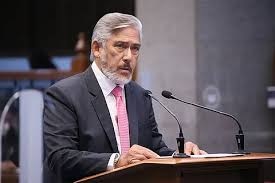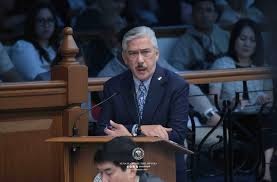Senate President Vicente “Tito” Sotto III has adopted a measured and unperturbed stance regarding the sharp drop in the Senate’s approval rating, choosing to view the recent Pulse Asia survey results as a temporary reflection of public sentiment rather than a definitive indictment of the chamber’s work. His reaction emphasizes continuity and dedication to duty, irrespective of fluctuating public opinion.
On Friday, Sotto communicated to reporters via a Viber message that the survey’s findings were merely “a snapshot of the past.” This phrase suggests that the data captured public perceptions in a specific, contained moment and may not accurately reflect the current disposition or future assessment of the Senate’s performance.

Analysis of the Plunge in Ratings
The results of the latest Pulse Asia nationwide poll, conducted from September 27 to 30, revealed a significant decline in public appreciation for the upper chamber.
Approval Rating: The Senate’s performance approval rating plunged by 11 percentage points, dropping from 53 percent recorded in the June survey to 42 percent in September.
Disapproval Rating: Correspondingly, the level of public disapproval rose substantially, increasing from 18 percent to 28 percent.
Indecision: Those who remained undecided also saw a slight increase, moving from 28 percent to 30 percent.
This sharp decline is widely attributed to the politically turbulent period during which the survey was conducted. The latter part of September was marked by separate, highly-publicized investigations into widespread corruption involving infrastructure projects, which allegedly implicated members of Congress. These allegations triggered leadership shakeups in both the Senate and the House of Representatives, creating an environment of scandal and political instability that invariably impacted public trust in the legislative branch.
Commitment to Diligence: ‘Tuloy Lang ang Trabaho’
Despite the discouraging figures, Senate President Sotto maintained that the 24-member Senate will not be deterred from its core responsibilities. Adopting the mantra of ‘Tuloy lang ang trabaho’ (Just continue the work), the Senate leader assured the public that legislative functions would proceed diligently.
“As always, surveys serve as guides to perceptions in that particular moment. In other words, a snapshot of the past,” Sotto said. “The Senate will do its work diligently no matter what.”
Sotto’s comments underscore a key aspect of legislative work: the duty to craft laws and perform oversight often involves controversial decisions and exposes corruption, actions which can temporarily erode approval ratings while ultimately serving the public good. The Senate, he implies, views its mandate as being guided by constitutional duties and legislative requirements, not solely by quarterly popularity polls.
The Broader Context of Congressional Turmoil

The dramatic shift in ratings reflects the deep public unease over the corruption scandals. Historically, public confidence in Congress tends to drop sharply when major corruption allegations surface, particularly those involving misuse of public funds intended for vital projects like flood control.
The resignation and replacement of former leadership in both the Senate (prior to Sotto’s assumption) and the House of Representatives during this period are symptomatic of the serious nature of the allegations. While the leadership changes themselves were a response to the public outcry and the necessity for institutional reform, the act of replacing top officials often highlights the underlying instability and the gravity of the problem, thus feeding into negative public perception.
By characterizing the survey as a “snapshot,” Sotto is asserting that the Senate’s true value will be measured by its continued output and its success in fulfilling its mandate—including addressing the very corruption that caused the drop—long after the initial media frenzy and the survey fieldwork have passed. The focus now rests on the Senate’s ability to stabilize its internal affairs and restore trust through tangible legislative and oversight achievements.





